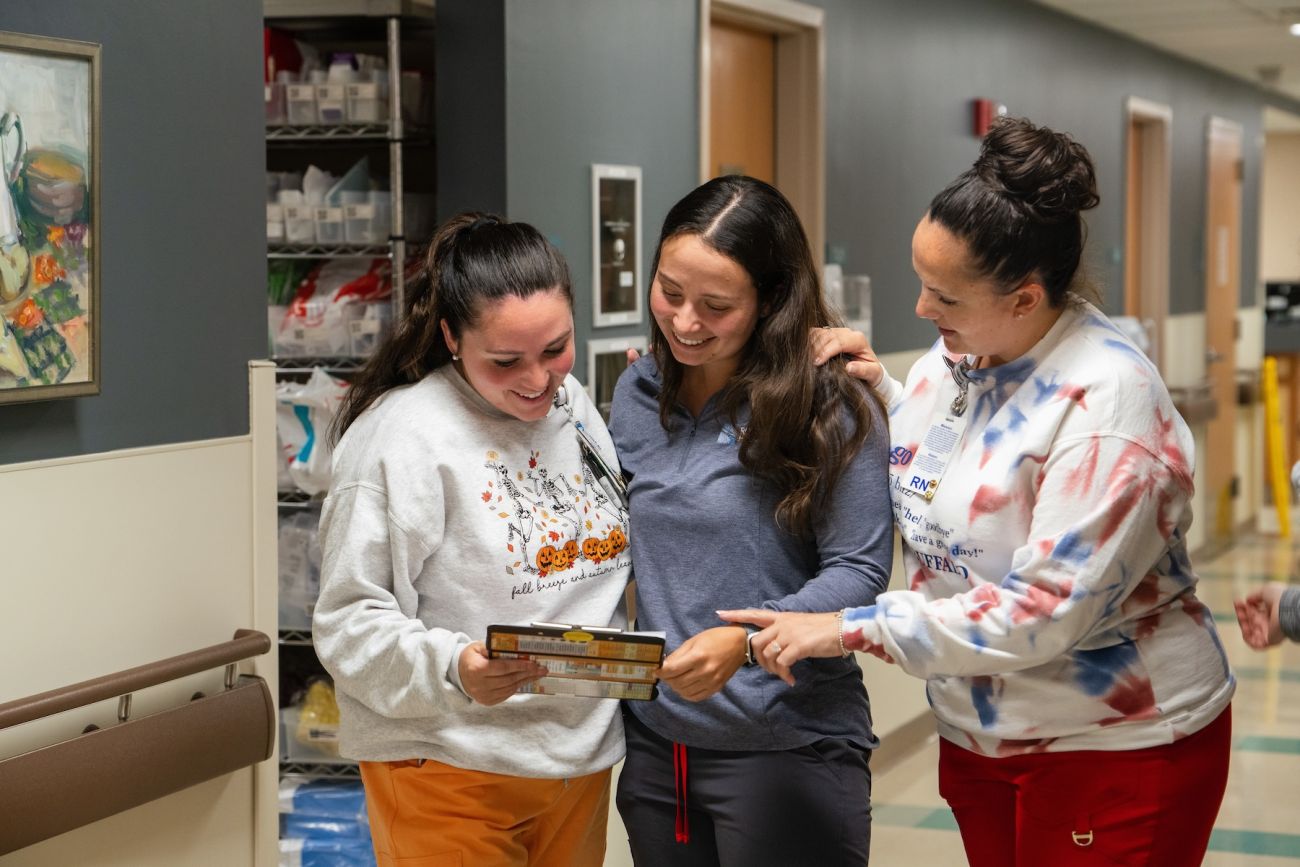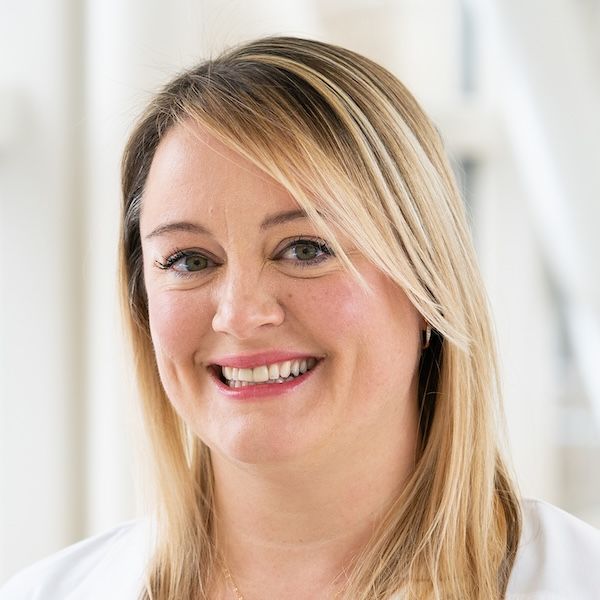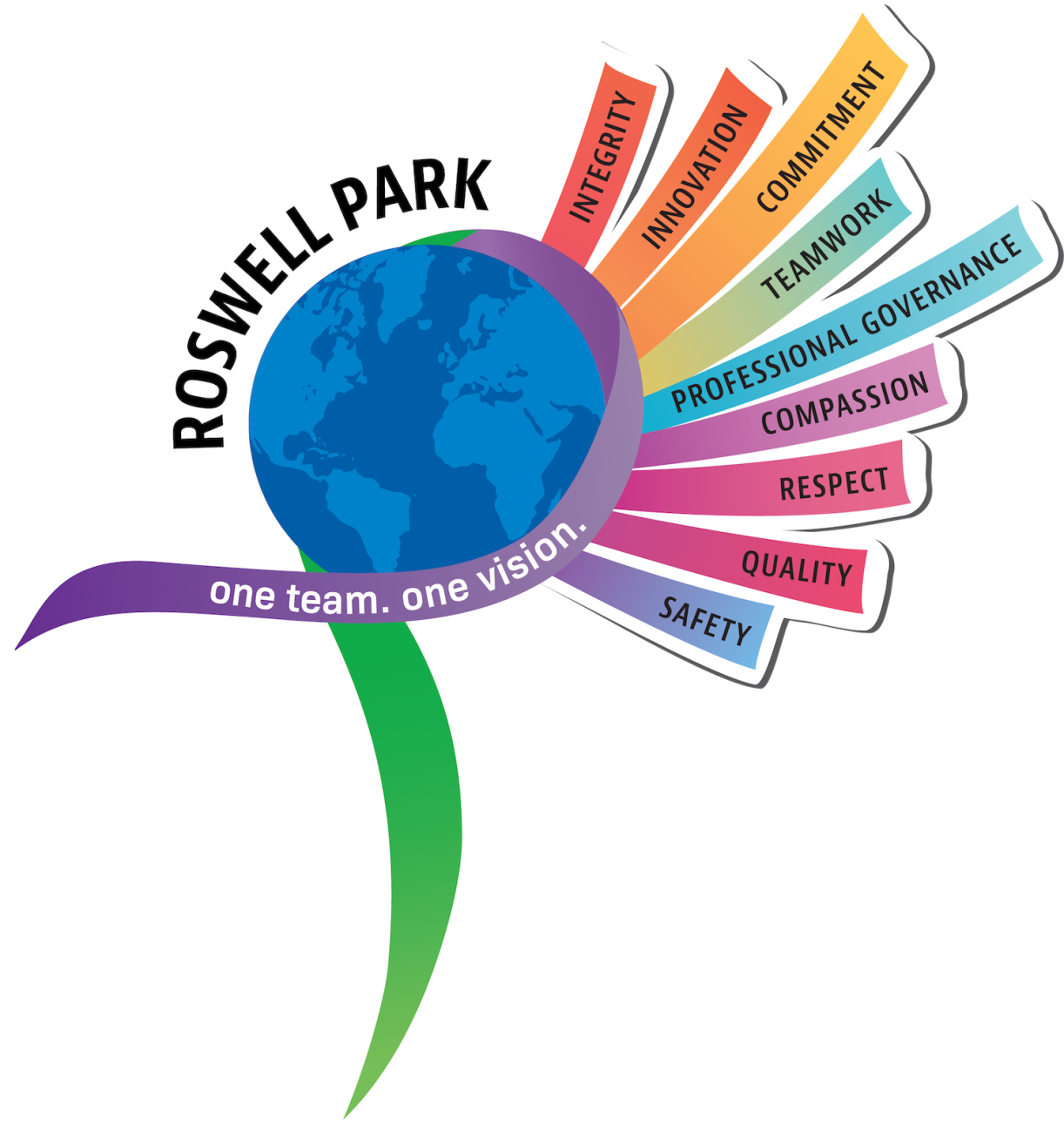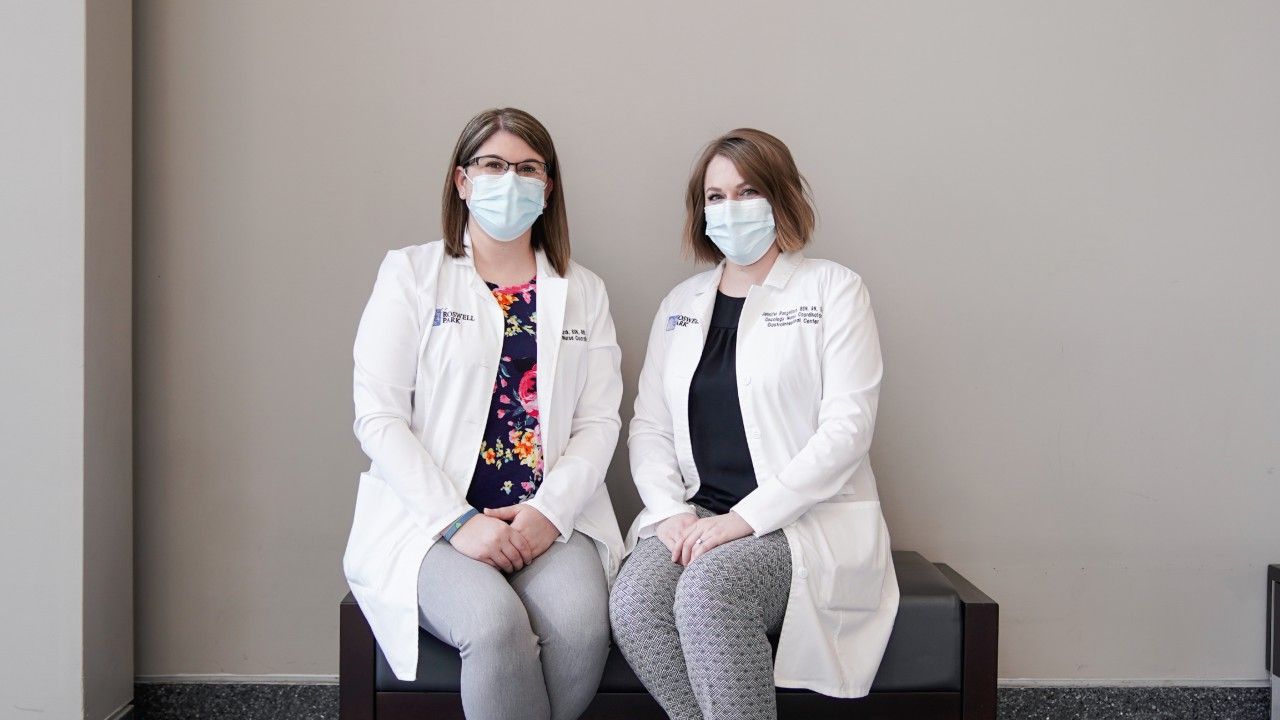Our patients have highly complex clinical, psychosocial and educational needs and Roswell Park nurses are a critical part of meeting these needs at every stage of cancer care, from diagnosis, through treatment, to survivorship.
A deep commitment to patient-centered care keeps Roswell Park’s nursing patient satisfaction scores consistently above national benchmarks. Roswell Park utilizes Press Ganey, a national leader in patient satisfaction research, which allows us to compare our patient satisfaction results with hundreds of other hospitals and peer oncology providers.
An interprofessional, rapid improvement quality initiative was created to implement a Tiered Huddle System, which is associated with an improvement in the rate of falls with injury in the inpatient setting. After starting the huddles on inpatient, the rate of falls with injury decreased for the longest stretch of days yet at Roswell Park. As changes needed to be made during the implementation, the rapid improvement cycle supported the changes to bring about positive and safe change on the inpatient units.
Roswell Park puts their patients first. Patients choose to come here for their care. Our nurses really care about their patients. A Roswell nurse not only cares for a patient’s basic needs, but has to go that extra mile and needs to fully understand the impact of cancer.Jessica Schultz, MSN, RN, OCN
Mission
To deliver quality, evidence-based, holistic nursing care to all patients and their families that is grounded in ethical decision making, nursing science and autonomous nursing practice. We achieve this through a commitment to our patients and their families, nurses’ personal and professional development, and nursing excellence.
Vision
To provide exemplary nursing care founded in evidence-based practice, science, and holistic care with compassion for patients and their families, as we face the challenges of cancer together.
Values
- Innovation: In healthcare, innovation is about finding novel ways to improve patient outcomes, enhance the quality of care, and address emerging challenges.
- Commitment: In healthcare, commitment extends beyond the dedication of individual carers within their roles. It also involves a willingness to continuously develop skills and knowledge.
- Integrity: Integrity is an essential characteristic for healthcare professionals. It fosters trust, improves patient outcomes, and contributes to a positive work environment.
- Compassion & Respect: In healthcare, compassion is about showing kindness, empathy, and understanding toward patients and their families. Compassionate care can help reduce patient anxiety, improve satisfaction with care, and enhance overall well-being.
Respect in healthcare involves treating patients with dignity, acknowledging their autonomy, and upholding their rights. It also involves respecting the cultural beliefs, values, and preferences of patients and their families. - Teamwork: Teamwork is a dynamic process that requires ongoing effort and commitment from all team members. By embracing the principles of teamwork, healthcare professionals can collectively achieve better outcomes for patients and contribute to a positive work environment.
- Quality & Safety: We believe quality and safety must be at the forefront of all our decision making. We integrate quality and safety into all that we do. We deliver care that seeks to eliminate all harm from patients and employees.
- Professional Governance: Professional governance empowers nurses to own the outcomes of their practice and advocate for the resources necessary to improve patient care and the work environment.
The role of the Roswell Park nurse
Nursing at Roswell Park involves a wide range of diagnoses and treatment approaches, encompassing these key areas:
Our nurses provide direct, comprehensive care to patients from pre-diagnosis to post-treatment. Ambulatory nurses are equipped with special skills and knowledge to follow patients through their journey at Roswell Park.
Ambulatory nursing roles include:
- Solid Tumor Medicine/Surgery Clinics. Nurses in these clinics (Breast, Gynecology, Gastrointestinal, Head & Neck, Neurology, and Sarcoma/Melanoma) provide comprehensive care for medical and surgical patients and are skilled in recognizing medication side effects and surgery complications.
- Liquid Tumor Clinics. Nurses in these clinics (Leukemia, Lymphoma, Multiple Myeloma, Infectious Disease and Transplant & Cellular Therapy Center) are skilled in hematological treatment regimens, performing blood product transfusions and IV conscious sedation for bone marrow biopsies, providing wound care, and recognizing side effects and oncologic emergencies.
- Dermatology. Dermatology nurses are knowledgeable about skin cancer prevention, skin related cancers and treatments.
- Chemotherapy & Infusion Center. Nurses in this center are knowledgeable about many cancer types and skilled in administering chemotherapy and biotherapy regimens.
- Supportive Services. These nurses work closely with our pain, palliative care and psychosocial teams to care for and support cancer patients.
Roswell Park Inpatient nurses care for oncology patients of all ages within specialized disease-specific units with specific nursing ratios and nurses trained for that patient population.
Nurses work in a multidisciplinary team that includes providers, pharmacists, social workers, dietitians, case managers, and therapists (OT/PT/respiratory). Nurses on these units are key to supporting and educating patients and caregivers to safely continue recovery and care at home. Our inpatient units include:
- Medical/Surgical Units. Our 18 bed Medical/Surgical units serve patients and their caregivers in the post-operative phase of care through discharge. These patients include those recovering from surgeries for neurological, breast, GYN, head and neck, thoracic, genitourinary, and gastrointestinal cancers, with some medical patients.
- 5th Floor. Our 14 bed units serve patients and their caregivers with leukemia, lymphoma, myelodysplastic disorders, and post bone marrow transplants. Treatments include chemotherapeutics, adoptive cell therapies, autologous and allogeneic blood and marrow transplant, system management and supportive care.
- 6th Floor. Our 18 bed medical units specialize caring for patients with a variety of solid tumors and hematological malignancies, who are undergoing medical therapy or have issues that arise from their cancer treatment. Nurses on these units administer chemotherapy, biotherapy and observe patients receiving radiopharmaceuticals.
- Critical Care Services. Our two units include 18 critical care beds and 10 intermediate care beds for patients with a variety of medical and surgical care needs. Registered Nurses on these units have advanced training in cardiac and respiratory management, and are responsible for ventilator management, cardiac and hemodynamic monitoring, use of invasive lines, administration of vasopressors and cardiac drips and provide emergency care when needed. Candidates must have a solid background in an acute care setting which includes medical/surgical experience. Certification in ACLS and previous experience in cardiac monitoring and step-down care is preferred.
Roswell Park performs an average of 10,000 surgical procedures each year ranging from lumpectomies to complex thoracic and neurological procedures.
Our Perioperative nurses play important and active roles at each step of care in each the perioperative arena. From preoperative screening to postoperative recovery care, our nurses care for patients of all ages for multiple surgical services including:
- Breast
- Plastic & Reconstructive
- Head & Neck
- Gastrointestinal
- Interventional Pulmonology
- Soft Tissue
- Gynecology
- Genitourinary
- Thoracic
- Advanced Endoscopy
- Neurosurgery
Perioperative nursing roles include:
- ASC RN. Admits and prepares patients for surgery; instructs and discharges patient post-procedure.
- OR Circulator. Assists in the operating room; advocates for patient while under anesthesia.
- PACU RN. Recovers patients from anesthesia; prepares for discharge or admission.
- Endoscopy RN. Assists in endoscopic procedures; advocates for patients while under anesthesia.
- Multispecialty RN Coordinator. Each area has at least one MSC; manages day to day patient schedule; maintains instrumentation and equipment lists for procedures; coordinates staffing.
- Endoscopy RN Coordinator. Provides pre-procedure instruction for Endoscopic procedures; maintains quality metric database, provides post-procedure support and patient follow-up.
The Oncology Nurse Coordinator role makes access to comprehensive cancer care appear seamless by improving communication and care coordination with patients and their care teams. These nurses are the one constant for patients throughout the cancer journey.
The nurse coordinators ensure follow-up calls and clinic visits are appropriately scheduled. Symptom management is handled timely and expertly, referring to the ATC if needed, decreasing unplanned hospital readmissions.
Nursing quality
At Roswell Park, we value integrity, quality and safety as key core values that directly impact care delivery and outcomes. Integrity ensures we maintain honesty and transparency, and perform our jobs based on the highest standards of care. Quality and safety are directly related to integrity in that we deliver the safest and most effective care possible. This also relates to safety event reporting. All events are reported, with or without anonymity, and are without repercussion. Event reporting is critical in the delivery of safe, effective care.
In addition, we collect, monitor and report data specific to nursing care. These measures, called Nursing Sensitive Indicators (NSIs) reflect the structure of care delivery, the processes by which we deliver care, and the outcomes of the care delivered. Examples of structure measures include nursing hours per patient day, nurse degree level and certification, and skill mix measures. Process measure examples include job satisfaction and pain assessment. Outcome measures include falls, hospital acquired pressure injuries (HAPI), catheter associated urinary tract infections (CAUTI), central line associated blood stream infections (CLABSI), and ventilator associated events and infections (VAE and VAI).
NSIs which were developed by the National Database of Nursing Quality Indicators (NDNQI). This agency defines and collects data from multiple healthcare facilities to create a benchmark, or goal that we use to know how well we are doing with a particular measure.
Bedside nurses are represented on all nursing quality councils and are at the forefront of care delivery innovations and decision making regarding these measures. Nursing quality councils are part of our professional governance structure and meet monthly and report issues and outcomes ultimately to Nursing and Medical Executive Leadership and the Board of Directors.
Patient Education/Patient Portal
A cross-functional team at Roswell Park comprising clinical nurses, Information Technology leadership, clinical informatics specialists and nursing administrative leadership collaborated to drive the design and implementation of an efficient digital patient education interface beginning with the Patient Education Portal.
Staff can now bundle together multiple education documents to easily deliver them to patients. Education bundles can be saved and shared. Patients can view all test results, clinical notes, scanned documents, and more of their medical information easily by simply signing up for our patient portal.
Nursing certifications
Increased nurse certification rates in hospitals have shown a decrease in failure-to-rescue and 30-day mortality rates when combined with the additional credential of bachelor’s degrees. Further, certified nurses make fewer medical errors and nurse certification is recognized by The Joint Commission as a method to improve patient safety. We celebrate all nurses who have taken the time and energy to improve your nursing profession and Roswell Park.
Roswell Park continues to support nurses who want to achieve professional nursing certification by offering the following certification programs:
- OCN® FreeTake program for Oncology Certified Nurse (OCN®)
- Certified Pediatric Hematology Oncology Nurse (CPHON®)
- Certified Pediatric Oncology Nurse (CPON®)
- Advanced Oncology Certified Nurse Practitioner (AOCNP®)
- Advanced Oncology Certified Nurse Specialist (AOCNS®)
- Advanced Oncology Certified Nurse (AOCN®)
- Certified Breast Care Nurse (CBCN®)
We also offer the Certified Med-Surg Registered Nurse (CMSRN®) certification through the Fail Safe program. Both programs are offered at no cost to Roswell Park nurses. With certification, nurses are given an annual compensation in their geographical differential.
Professional governance
Professional governance is an organizational model whereby nursing staff are involved in making nursing practice decisions that previously were made only by management. Professional governance shares power with administration in matters such as nursing practice, management, quality outcomes and education. Research has shown that professional governance improves staff satisfaction and patient outcomes in participating hospitals.
Roswell Park’s professional governance structure empowers nursing staff at all levels to partake in councils and committees that range from staff and patient satisfaction to nursing quality outcomes. Clinical nurses, nurse practitioners, and patient care technicians collaborate to improve patient clinical outcomes and satisfaction. Staff are invited to participate in the councils to be the voice for patients and their nursing units. When serving on the councils and committees, staff can bring current opportunities for improvement to the table for resolution or innovation.
We have a one-day meeting assembly, known as the Day of Progress. Unit based councils meet to discuss topics related to their individual nursing units, while quality councils work on specific quality measures such as patient falls or catheter associated urinary tract infections. All meetings occur throughout the first Wednesday of the month, and staff members and managers plan schedules and patient assignments to foster attendance at the council meetings. The structure further supports same day reporting to the Executive Nursing level who work to remove barriers and facilitate movement on staff presented concerns.
I believe that nurses here have a say in changes that are being made on the units... There is definitely a shared governance in place. If a nurse feels that they have a better way to do a process or policy, there are channels or outlets available to seek change.Delaney Finewood, BSN, RN
Day of Progress
In May 2022, Roswell Park Nursing held its inaugural Day of Progress (DoP), which is a method to give control of nursing practice back to the nurses at the bedside. The DoP consists of 32 different councils and committees aimed at improving patient care and staff outcomes at Roswell Park and supporting the greater Buffalo community. Throughout the last year, the clinical nurse involvement in DoP has led to a number of accomplishments.
- The Twilight Day of Progress (TDoP) developed a self-care page on Roswell Park’s intranet, titled "Health Promotion for Night Shift Workers." This page includes tips and tricks that nightshift nurses use to sleep, parent, how to drive home safely after a long shift, and team building.
- Project United Nurses (Project UN) is guided by the key strategic priority to promote and improve cultural awareness in nursing practice. Project UN does this by sharing real-life experiences of those from different backgrounds in the quarterly Nursing Newsletter and ensuring updated, relevant, and accessible educational intranet content for all Roswell Park employees to improve cultural competency, awareness, and inclusion.
- Recruitment and Retention Committee developed an exit interview process and form for staff members transferring internally. This will help to identify reasons that staff members move from one unit to another and assist in devising methods to retain staff.
- The Nursing Elective Council developed the Task Nurse role so that nurses could pick up short four-hour overtime shifts to cover nursing skills and tasks on the units. This allows for short time slots with no official patient assignment while allowing the nurses working on the unit to focus their attention on their patient assignments when delegating tasks to the Task Nurse.
- The Ambulatory Quality Committee implemented the Evidence-Based Practice project utilizing stickers for patients with an accessed port. This allows the clinic staff to know when a patient has an accessed port to remind the staff members to de-access the port before discharge.
- Ambulatory Falls Prevention Committee added notification to the patient portal, implementation of wheelchairs throughout the hospital for patients, increased the wheelchair inventory for the hospital, and posted signs throughout Roswell Park with transport phone numbers for easy patient access and safety.
- The 7 West Unit-Based Council worked to implement the Quiet Noise Channel on the televisions. Earplugs and earbuds are used with the call lights to improve patient satisfaction with noise in and around the room at night.
- The 7 West Unit-Based Council decided to take over the Patient Safety rounds from Nursing Quality and conduct them as peers on their unit. For six months while the direct-care nurses conducted the patient safety rounds, there were no central line associated bloodstream infections (CLABSIs), catheter associated urinary tract infection (CAUTIs) or hospital acquired pressure injury (HAPIs) recorded on the unit.
- The Professional Development Committee developed a Shadowing Program for all staff members at Roswell Park. More than 50 employees have completed the shadow opportunity from many departments and levels of the organization, many outside the nursing department.




